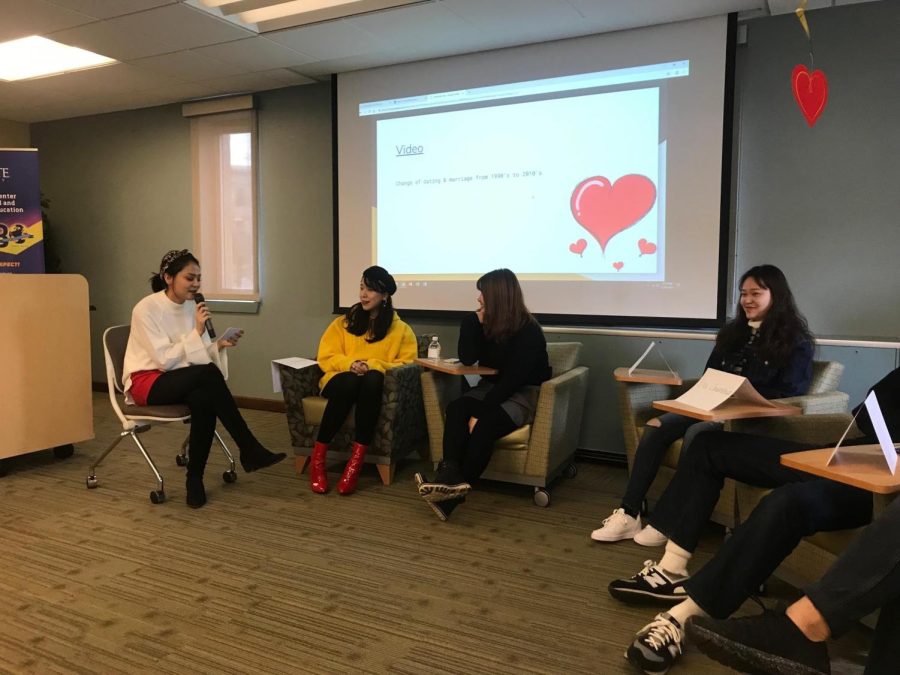Students learn about multicultural relationships at second Coming Together event
The Center for International and Intercultural Education hosted a Valentine’s Day event as part of the Coming Together series to bring Chinese and Nigerian cultures together to share their practices and traditions in dating, marriage and relationships.
Graduate assistant Winnie Bush, representative for Nigeria, had the audience in awe as she presented the Nigerian practices of marriage through skits, song and dance. She presented the distinctive beliefs and practices of marriage in her culture, and how it resembles American culture as well.
“Nigerians don’t date. When you come to the United States you are free to do whatever you want, but when you go back home you can’t tell your parents you’re dating,” Bush said. “Even just going to another kids house for a playdate, we don’t do that.”
Nigerian culture focuses on the importance of marriage and it is a special moment in their lives. Bush showed skits representing the three types of marriages in Nigerian culture. The “White Wedding” resembled the kind of wedding that many Americans are accustomed to. The other two kinds of marriages showed their own unique practices involving lots of music and dancing, as well as a strong emphasis on family support.
“Once you get to 21 or 22, your parents typically start to talk to you about getting married to someone,” Bush said. “Dating is not something that is encouraged back home. They just expect you to find the one at a certain age.”
Graduate assistant Aierken Subinuer was the representative for China along with a panel of international undergraduate students who represented regions from all across China. Subinuer asked the panel questions about their dating experiences and what it was like dating back home for each of them in their own cultures.
“The theme is coming together, so we want to have this opportunity to have not just international students, but also domestic students to learn from each other,” Subinuer said, “and also getting to know about a country but not just stereotype a country because there’s different practices even in dating and marriage in different regions so that’s what I wanted people to take away from our presentation.”
One of the topics around dating and marriage that was continually brought up was the involvement of parents in a relationship. Nigerian and Chinese culture emphasize a strong influence of parental involvement in their child’s relationships and marriage.
“Seeing how Nigerian marriages are and seeing how Chinese marriages are, I think it’s completely different in dating, the perspectives American people might have,” Subinuer said. “Here in the U.S. it’s more direct and parents are not too much involved, but the other two countries are completely different. It’s exciting to learn about.”
Dr. Linda Robertson, director of the Gerald Read Center for International and Intercultural Education, brought international Kent State graduate and undergraduate students together for part two of the Coming Together series. The goal was to bring cultures from around the world together to share some of their unique differences face to face and realize that they may have more similarities than they had previously thought.
“Within these large countries, very populated countries, there are huge regional differences,” Dr. Robertson said. “We have regional differences in our own country, but we forget that about others.”
According to Dr. Robertson in the College of Education, Health and Human Services there are over 150 students from 40 different countries including 32 different majors spread out across five separate buildings on campus. She says that it is easy for many of these students to never cross paths due to their schedules and how spread out the classes are. Events like the Coming Together series help bridge the isolation gap between those students that otherwise may not be connected.
“The opportunity for international students to interact with each other (at Kent State) and even with Americans may not even be as great as what we would think,” Dr. Robertson said. “What we’re trying to do with this series of international presentations is to have them feel part of a community and to feel deeper into the community at Kent State.”
Dr. Robertson said events like the Coming Together series are designed to help individuals from different backgrounds see what life is like in other parts of the world and provide insight into the cultural differences and similarities that everyone shares. These events welcome people from all cultural backgrounds to come and share their traditions and beliefs with one another to further enrich the community of Kent State.
“Regardless of where you are from, we’re all human beings,” Bush said. “We might not have the same traditions or eat the same food, but we are all humans… Celebrate culture, celebrate life, and be inclusive. Go experience life outside of what you see every day.”
Jack Thompson covers Hispanic and Native American diversity. Contact him at [email protected]



